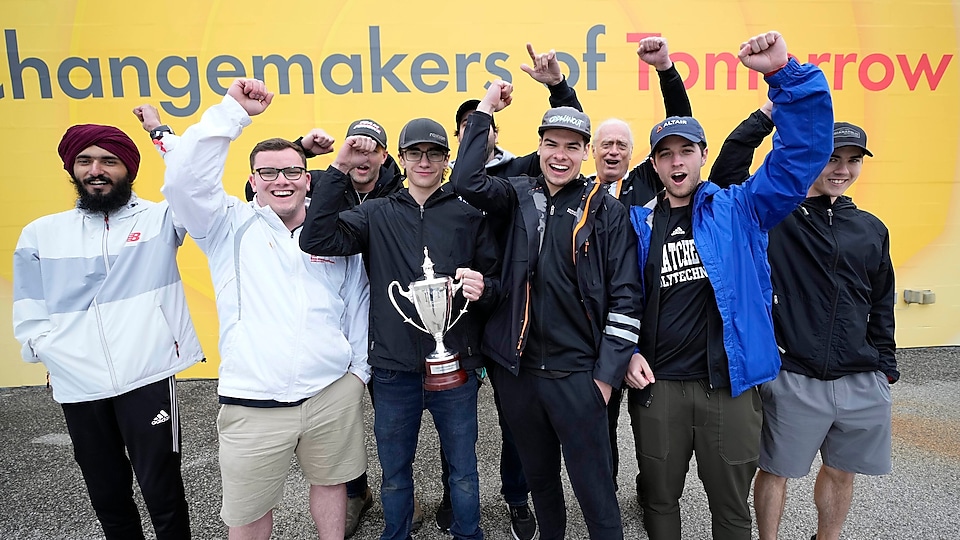Shell Eco-marathon Americas 2023 inspires student innovation
SaskEco UC, from Saskatchewan Polytechnic, won first place in the Urban Concept category, Internal Combustion Engine, and third in the Prototype category, Battery-Electric. Their first-place win qualifies the team to compete at the upcoming Shell Eco-marathon World Championship Series!
What began as a wager between a group of scientists who worked for Shell in 1939, who challenged one another to drive the furthest distance on the least amount of fuel possible, is known today as Shell Eco-marathon. After officially launching in 1985, Shell Eco-marathon has become a world-leading competition that invites high school and university students to design and build energy efficient vehicles that meet a specified set of criteria.
Teams can choose to compete in two vehicle classes:
1. Urban Concept: vehicles that have familiar road car features (always 4 wheels)
2. Prototype: ultra-efficient, lightweight vehicles (generally 3 wheels)
Teams must then choose between three energy categories:
1. Internal Combustion Engine (gasoline, ethanol)
2. Battery Electric
3. Hydrogen Fuel Cell
Teams are predominantly comprised of a variety of engineering disciplines, from mechanical to environmental, to software. Shell Eco-marathon is the ultimate opportunity to put what they’ve learned in the classroom into practice, with the chance to iterate their approach year-over-year through the course of their studies.
“Inviting bright, young people to take on the challenge of designing efficient low-carbon transportation solutions is what will progress our industry for the long-term. Shell Eco-marathon provides a platform to think big and get hands-on to implement potentially ground-breaking solutions,” says Susannah Pierce, President & Country Chair, Shell Canada.
SEM Americas Video: ENGLISH
Title: Shell Eco-marathon_FINAL
Duration: 1:11 minutes
Description:
This video celebrates the Shell Eco-marathon Americas 2023 and the innovation and collaboration required from post-secondary students to design and test energy efficient vehicles.
Shell Eco-marathon_FINAL Transcript
[Background music plays]
Fast paced and energetic music playing.
[Animated sequence]
Zoom in to group of students who participated at the Shell Eco-marathon Americas 2023 competition in Indianapolis.
[Text displays]
Shell Eco-marathon Americas
Investing in Canadian students
[Transcript body]
The Shell Eco-marathon is a competition that Shell’s had for many, many years.
The challenge we’ve got today is that we use a lot of energy, and the energy that we use is high in carbon emissions.
And so what we’re trying to do is find ways of using less energy with lower carbon emissions and part of the energy we really need to be looking to change is energy used in transportation.
Students have come together; they’ve designed a vehicle that can use less energy and lower carbon energy and that for me is inspiring because it shows that these are the people who will be building the vehicles in the transportation sector in the future.
And for us right now it’s really exciting because now it’s all about increasing vehicle efficiency but also looking at a whole host of different types of fuels, including electric, including hydrogen.
And they’re going down to compete with other teams from all across the Americas.
These people have worked so hard, 20, 40, 60 hours a week to create what we hope will be a winning entry into the competition where again they’ll show how well this vehicle will run with less fuel, ultimately with lower carbon fuel and that’s all that Shell is looking for as well – what are the designs of the future? I think I’ve seen some of them here today.
The Competition
Shell Eco-marathon Americas 2023 took place in April at the Indianapolis Motor Speedway where teams from Canada, the United States and Mexico squared off to put their designs to the test for the chance to compete at the World Championship in Bangalore, India.
This year, Canada was well-represented with a total of 11 teams participating from the following schools:
- Northern Collegiate High School, Sarnia, ON
- Université de Laval, Quebec, QUE
- Université de Sherbrooke, Sherbrooke, QUE
- University of Toronto, Toronto, ON
- University of Ottawa, Ottawa, ON
- University of Manitoba, Winnipeg, MB
- Saskatchewan Polytechnic, Saskatoon, SK
- University of Alberta, Edmonton, AB
- University of British Columbia, Vancouver, BC
The Results
Before they are allowed to compete on the track, Urban Concept vehicles need to pass a series of 13 technical inspections. For some, the only goal is getting through this test. Many never even make it that far.
Congratulations to SaskEco UC, from Saskatchewan Polytechnic who not only passed technical inspection, but won first place in the Urban Concept category, Internal Combustion Engine, and third in the Prototype category, Battery-Electric. Their first-place win qualifies the team to compete at the upcoming Shell Eco-marathon World Championship Series!

SaskEco, UC from Saskatchewan Polytechnic won first place in the Urban Concept category paving the way for their spot at the upcoming Shell Eco-marathon World Championship Series.